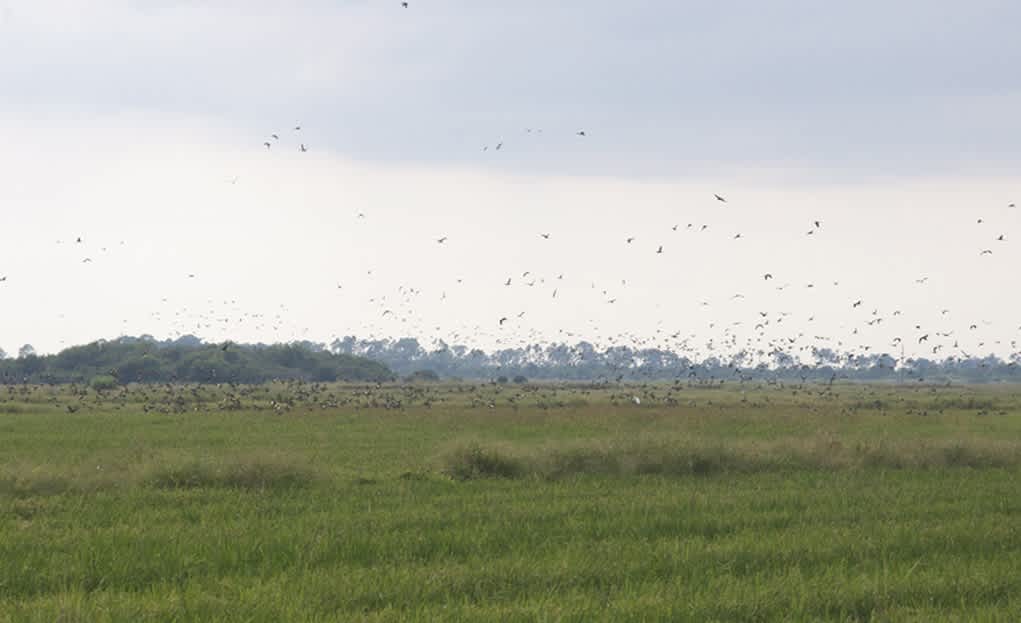Louisiana: The Sportsman’s Paradise, Part Two
Josh Wolfe 11.21.13


Along the coastal marshes we drove; Spanish moss creating a canopy overhead, the wind tickling the reeds on either side. Our plan had been to hike some nature trail, but due to the government shutdown, we were heading toward an alternative: Grosse Savanne Eco-Tours.
Kaylen Fletcher, the public relations manager for the Lake Charles Conventions and Visitors Bureau, picked me up that morning, bent on showing me some of the finer aspects of the surrounding area. Like I mentioned previously, I was building a strong notion of why Louisiana is the “sportsman’s paradise.” A few minutes later, any doubt would leave my mind.
We pulled into the parking lot where we met Grosse Savanne’s manager, Bobby Jorden. Like so many others I’d met in southern Louisiana, his was a friendly face and a firm handshake.
“Glad to meet ya,” and we hopped in Bobby’s truck for a boat tour of the 500-acre private, man-made marsh. From the lodge to the boat ramp he pointed out various birds and such and continued as the three of us got into a johnboat.

“There is just so much wildlife here,” he went on. “I mean you see that alligator here on the bank, an ibis there in that tree. Not to mention this marsh is full of largemouth bass. Didn’t think about it, but should have brought along some fishing poles.”
That just sounds too good, I thought.
Grosse Savanne offers several different packages for guests, including a two-hour, half-day, or full-day trip with a maximum of four people per guide. Whether you’re a birder, photographer, or just a nature lover, you can customize your trip in various ways. Take a boat tour in the marsh as we did, go on a nature tour over the 50,000 acres of private land, or don your camera and set up in one of the strategically-placed photography blinds, which are set up in their most productive rookeries.
If I’ve ever been around so many different species of birds in the wild, I didn’t know it. Lucky for me, Bobby was a wealth of knowledge. He pointed out and named birds that I’d never heard of—various ducks that never make it farther north than Louisiana, spending the majority of their time in South America; he explained that the Roseate Spoonbill (as well as their brethren, the flamingo) are pink because of their diet, they are not born that way.
“It’s the iodine in the crustaceans they eat,” explained Bobby. “Diet-derived, if you will. They’re actually born white, and if you take one of their feathers and leave it in the sun for a day or two, it will turn back to white.”
American water lilies parted as the boat continued pushing through the marsh until we were back at the boathouse. Once again in Bobby’s truck, we rode out into the rice fields. Now, I’ve done my fair share of duck hunting, and have been fortunate enough to see them in what I thought were large numbers. But until I arrived at Grosse Savanne, I really don’t think I’ve ever seen ducks nearly blacken the sky in their flight, wings beating so loudly that the Earth’s plates might as well have been shifting.

“Blue wing teal,” said Bobby excitedly. “They are dusting up on their Spanish, getting ready to head south.” But at least for the moment, as we sat looking, more and more ducks continued to get up from the rice stubble. It was literally wave on wave.
Located in Cameron Parish, Grosse Savanne is also a hunting and fishing outfit. In fact, of Cameron Parish’s 900,000 acres, 750,000 of that are defined by coastal wetlands and other natural areas.
At Grosse Savanne, they attest that their lives are linked closely to the land and the water that surrounds the property and Cameron Parish, and just by spending a couple of hours with Bobby, that was readily apparent. The fact that he’d guided thousands of people throughout the summer was not present in his mannerisms—his enthusiasm did not wane a bit when it was just the three of us. It was my first time at Grosse Savanne and Bobby’s excitement with each wave of birds rivaled my own.
We returned to the office, ready to depart for Lake Charles and my last night in Louisiana, the sportsman’s paradise. I still can’t get over the land, the people, and the animals—not to mention the food and drink. Along the way I’d received various invites to “Come on back down and hunt and fish with us if you get a chance.” And while those might have been half-hearted suggestions, I heard them with both ears. Louisiana, I won’t stay away too long.
Click here to read part one of this story.

